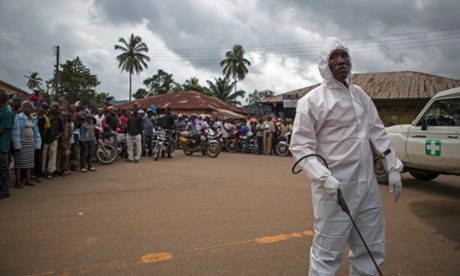Series: Guardian Africa network
Despite promises of western aid, local health workers are short of everything from paracetamol to protective clothing

Doctors fighting Ebola in one of Sierra Leone’s biggest towns have said they are running out of basic supplies of medicine and protecting clothing, despite promises of international aid.
The UK has said it is committed to boosting public health provision across Sierra Leone, building at least four new Ebola treatment facilities near urban centres, including one in Makeni, a large commercial hub about 120 miles north of Freetown.
But with a 600% increase in cases, locals health workers say they can’t wait and are in desperate need of rudimentary supplies ranging from mattresses to paracetamol.
“We have almost no protective equipment,” said Adam Goguen, director of academic affairs at the University of Makeni. “Hundreds of PPEs (personal protective equipment) a day are needed just to keep the primary holding centre stable.”
“Previous equipment is exhausted. Our pharmacies are running out of medicine for even malaria and typhoid.”
Patrick Turay, a doctor at the Holy Spirit hospital in Makeni, said there was a desperate shortage of basic supplies, ranging from body bags for secure burials to examination gloves to mattresses and pain relief tablets.
He appealed for donations of surgical spirits, bin bags, alcohol gel and hard protective boots from size five to eight.
There is no hospital treatment for Ebola in the area, but patients are put in a temporary holding centre before onward travel to Kenema, a city two hours away.
“The situation in the holding centres is becoming desperate, as patients receive no care and Kenema is not accepting all the confirmed patients for treatment. But if we do not isolate them now we will lose all control,” he said.
At a conference in London yesterday, experts said the five people were becoming infected with Ebola every hour in Sierra Leone.
As the epidemic escalates, international aid is barely able to keep up. The disease has already raced far ahead and is having a devastating effect in places like Makeni, which is hours from the original outbreak zone to the east of the country.
Sr Mary Sweney, who runs a local school, says she is concerned about the numbers of children now left without parents.
“Many children have been left orphaned already and the numbers will increase while others will suffer greatly from the financial impact of this crisis,” she said.
Unicef, the UN’s children’s agency, said 3,700 children, some as young as three and four years old, were mourning dead parents and were in urgent need of support as they felt “unwanted and even abandoned” by frightened and suspicious relatives.
These children are threatened with a new kind of quarantine – isolation from their extended families, said Kelfa Kargbo, director of Street Child in Sierra Leone.
“The challenges of supporting this category of children are not underestimated. It is clear that many of them are facing great stigma and this is proving a barrier to some of the usual positive responses you would expect from the child’s wider family in these situations.”
Makeni, capital of the Bombali district, was placed under quarantine along with four other districts as part of a lockdown of more than two million people.
Locals says there are rumours of another lockdown on the way as the government drives to contain the disease.
Earlier this week the government was forced to issue a statement after Makeni local celebrations began when a group of suspected Ebola victims were released from a holding centre with negative lab test results.
Crowds surged onto the streets chanting “Ebola is no more” and “Ebola is defeated”.
Local health officials said they feared the celebrations in Makeni may have exacerbated the contagion.
